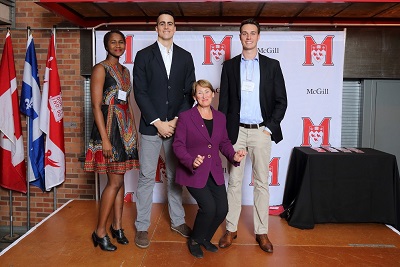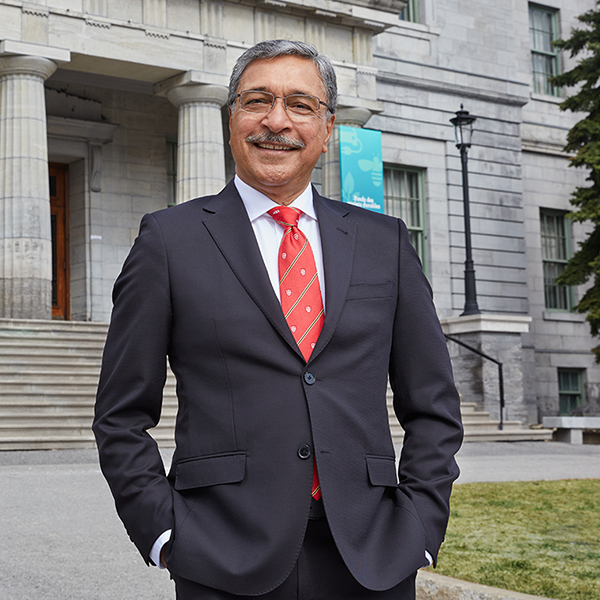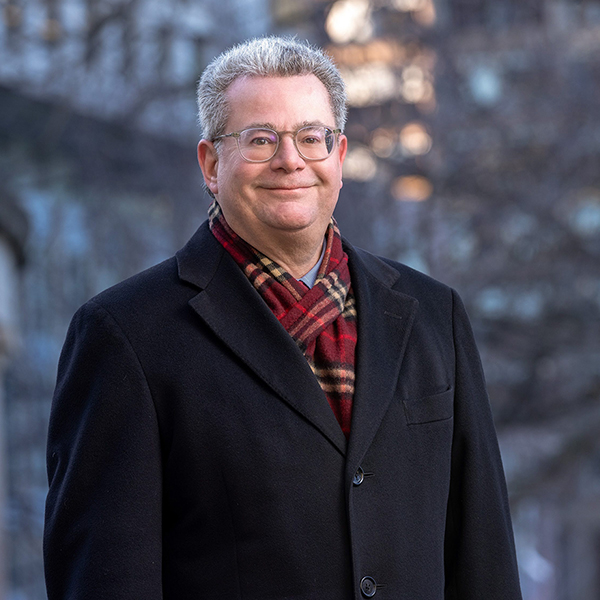After an eventful nine years as McGill’s Principal and Vice-Chancellor, Suzanne Fortier, BSc’72, PhD’76, recently stepped down from the position. Before leaving the Principal’s Office behind, she shared her thoughts with the McGill News about what she was thinking when she walked through the Roddick Gates on her first day on the job, and why we shouldn’t be too surprised if we continue to see her on campus in the weeks to come.
It doesn’t feel so long ago that I interviewed you when you were first named as McGill’s new principal. And now you are stepping down after nine years in that role.
It went by so quickly! It’s a strange thing how time passes. When you start a position like this, it takes about two years before you feel like you’ve grown out of being the “new principal.” And then, suddenly, you are the principal, and people act like you’ve been there forever. And that you’ll stay forever too!
Do you remember your first day as McGill’s principal?
I have a very clear memory of walking through the Roddick Gates on that first day. There were chemistry students in their lab coats to greet me. Coming through those gates has always been special to me because I still have memories of doing that as a new student at McGill and it is associated with many emotions. The excitement of being a part of McGill, absolutely, but also a feeling of trepidation – am I going to be good enough? Will I meet McGill’s high standards?
And when you come here as a new principal, you experience a similar trepidation. You know that this is a very special community filled with extremely smart people. You wonder, will I be able to do a good job for them? Will I be able to deliver results for them?
The other thing I remember feeling very intensely on that first day, was that I was back home. I had been away from my alma mater and from Montreal for 32 years. Of course, I came back often, but to be able to live in Montreal again was fabulous. I never imagined that I would be away for so long. I had great experiences [in my career] and my years at McGill really opened all those doors for me. But I had a very powerful sense that I was now back where I belonged. To be able to finish my career here, it is fantastic.
You experienced McGill as a student and then, decades later, as its principal. What was the same and what had changed in those years?
What is very similar is that, when I was a student, I never had the feeling that I was just a number. Some of my peers, students who went to other universities, said that was how they felt, that they were just the number on their student cards. McGill wasn’t like that for me at all. There were people here who really helped me – and I needed that help sometimes. I didn’t speak English very well at the beginning, for one thing. I felt that I was part of a community here and that there were people who paid attention to me and were ready to help.
I believe that remains true today. For me, that is an essential part of McGill. I think that is something that is precious to all of us here.
Now, things have changed, of course, and in many ways for the better. Even when I was a student, McGill was a very diverse community – but I don’t think we celebrated that diversity in quite the same way. I don’t think McGill was always as welcoming as it could be to people who were seen as “different.”
We have been thinking about our Bicentennial these last two years. There is much to celebrate, but we also have to admit that not every part of our history was great. And I believe we have learned from that. It is not enough to say that McGill is a welcoming place. McGill should feel like home for every member of our community – this must include Indigenous people, people of colour, people with disabilities and people of all sexual orientations and gender identities. We are not just welcoming them to our home. It is their home too. I think we have recently made some very important progress in that direction.
A great image that comes to my mind is the McGill a cappella group, Tonal Ecstasy. Members of Tonal Ecstasy represent a range of lived identities and experiences. Collectively they create wonderful harmonies and the joy they experience in singing together is plain to see. To me, they exemplify what we are building at McGill.
You have often talked about how universities can be powerful drivers of social inclusion.
Years ago, I took part in a ceremony at Molson Stadium to welcome new students to McGill. I had an appointment right after that, so I jumped into a taxi. The driver, who didn’t know who I was, told me that it was one of the happiest days of his life, because his son was starting at McGill.
He explained that his son was exceptionally bright and that he had been accepted everywhere he had applied, including top elite American universities. But the driver advised his son to go to McGill, because at McGill he would fit in. At McGill, he would be accepted. At some of those other schools, he worried that his son would not have a sense of belonging, he would not feel at home. He didn’t want that for his son.
That really touched me. McGill is a place where people come from everywhere and from every background. We want to remove barriers, particularly financial ones, that may stand in the way of students who clearly have the talent and the commitment to work hard to succeed at McGill.
People take great pride in the fact that, for 17 straight years, Maclean’s has rated McGill best or tied for best in the medical doctoral category in its annual rankings of Canadian universities, but the one ranking that means the most to me is that we are number one for scholarships and bursaries. We have made a major commitment as a university to ensuring that we have a strong support system for our students, and our alumni have played an invaluable role in helping us to build that.
One phrase that I learned from our alumni, which I didn’t know before, was “paying it forward.” The sense that there were people who had helped them when they were students, and they want to be able to provide that help to someone else today.
You have been very focused on the quality of students’ experiences at McGill – not just inside the classroom, but outside too. Why is that?

To me, the university experience should be very broad. It is composed of several elements. Of course, you need great professors and the best classes that we can offer – that is the foundation. But it is not enough. Students should have access to many other things, whether it is student clubs, or research internships, or study abroad opportunities, or community work.
I think of initiatives such as the Dobson Cup and the McGill Engine and the opportunities we provide for entrepreneurial students with good ideas. I think of all the interesting activities that students organize for other students. To me, that’s all learning and it is all essential. Simply sitting on the grass and having a coffee with another student who has different life experiences than you, that’s learning. It is all invaluable. With the pandemic, we were not able to be on campus together for several months and we were aware of just how much we missed those things.
You took the time to see many of those student activities for yourself. It’s well-known that you like to attend student productions at the Schulich School of Music, but you also went to classes and McGill sports games and other events. Why was that important to you?
One thing that I realized early on was just how much McGill had to offer – conferences, classes, concerts, sporting events. I wanted to make the time to take advantage of some of these opportunities: to attend a class or to go to a football game or to attend a staff event or an academic conference. It was worth it to work an extra hour or two in the evenings to catch up on my work, to be able to participate in these special moments.
Last semester, I went to a course in linguistics and another in jazz composition. It was fun! I love to go to master classes in voice. I attended many conferences at McGill. I am often asked to say a few words of welcome and I always tried to stay for at least the opening lecture and learn about the topic of the conference. However, it was rare when I could stay for the whole conference.
I am looking forward to participating in more of those events and to benefiting more from all that McGill has to offer. There are a few advantages to getting older and this is one of them. I will have the time to do this. I have all these opportunities to keep learning.
I plan to stay active working on boards and organizations involved in some of the issues that are dear to me – the future of higher education, and the future of science and technology. But most of all, I want to keep learning.
One thing you couldn’t have envisioned when you became principal was that McGill and the entire world would have to grapple with a global pandemic. How do you think we fared?
I am intensely grateful to the McGill community. Our community kept calm. They continued to work hard. They supported one another. It was very inspiring to me. I participated in many of the online classes. So many of our professors went out of their way to make their classes exciting and interactive.
The work of the University carried on. We made important headway on projects like the New Vic. Our research programs were very productive. In fact, many of our professors made major contributions to Canada’s and Quebec’s responses to the pandemic through initiatives like the COVID-19 Immunity Task Force, the Quebec Biobank, the Canadian VirusSeq Data Portal and the McGill Interdisciplinary Initiative in Infection and Immunity (MI4).
I remember talking to [Vice-Principal (University Advancement)] Marc Weinstein in the early stages of the pandemic, and he was telling me that we might have to lower our expectations for raising funds because of all the uncertainty. Marc is rarely wrong, but I’m happy that he was wrong about that. Our community rallied around us.
I also have to say that there was no better place for McGill to be during this difficult period than in Quebec. The government views higher education as an essential service and they reassured us very early on that they would support us financially, no matter how many or how few students we had. That gave us a sense of security during a very uncertain time. That was huge.
The government recently indicated that it supported McGill’s plans for The New Vic Project – a project that you have been very involved with. What are your hopes for the project?
The focus on sustainability is so important. It is one of the great challenges of our time. And it is a complex challenge. That is why the project will involve contributions from so many disciplines – chemistry, geology, biology, engineering, urban planning and others. And, of course, our public policy experts will play a significant role, because it is not enough to come up with scientific solutions, you need to be able to implement those solutions. You need to get governments – and the people who vote for those governments – to accept those solutions.
An important question, of course, was where could we house this initiative? We don’t have too many options due to the location of McGill. We are landlocked.
The old Royal Victoria Hospital site is right in our backyard. It is an incredible site, but also a very challenging one, due to heritage concerns, and because it is on the mountain.
The government has come forward with a very strong commitment to help us return the site to its original beauty. I think the vision we have developed for the site is remarkable. It is going to be a very welcoming place and it will be iconic, not just for McGill, but for the city and for Quebec.
You talked earlier about your memories of McGill as a student. What are some of your favourite memories as McGill’s Principal?
There have been so many moments of joy and pride. It is hard to choose!
I will mention only one that is so much a part of our lives at McGill, our convocation ceremonies. Standing on the convocation stage and seeing the sheer joy and enthusiasm on the faces of our new graduates, and the look of happiness and pride on the faces of their family and friends was always so special to me.
Listening to the tributes to our teaching award winners from their students, as well as hearing about the dedication of our staff award winners, from so many different parts of the University, was also truly moving. Of course, people know of my love for music and there have been so many moments of absolute delight with our music students. I love opera and when I hear those beautiful voices, it is always amazing.
You hear about people my age having a bucket list. Well, I have a list of buckets. These buckets contain moments of pride, moments of joy, moments of discovery and inspiration, and moments of friendship. I have all these buckets that are full of wonderful memories and McGill has made a huge contribution to those buckets. I think those memories will last for the rest of my life. I will forever be grateful.

